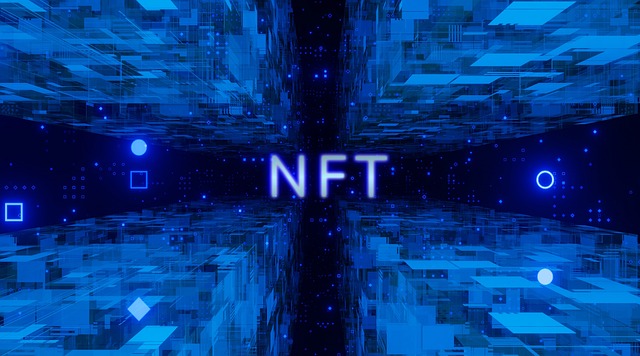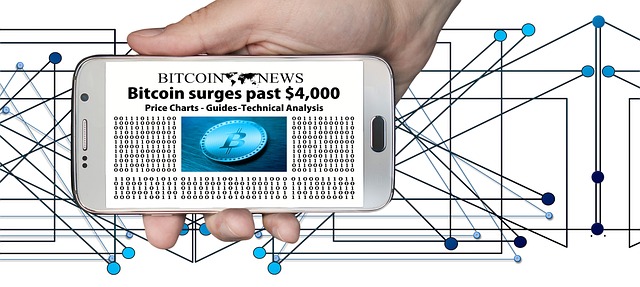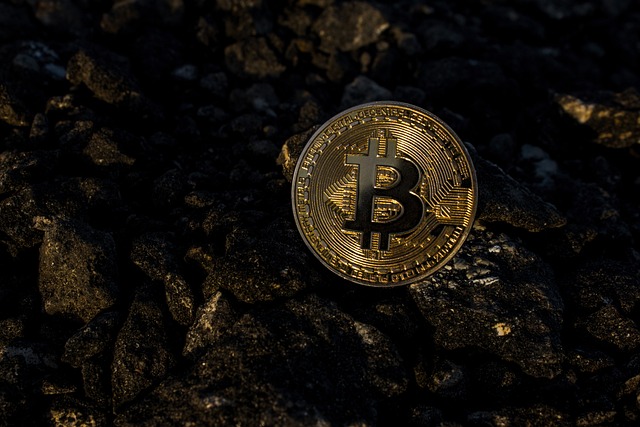DeFi’s Blueprint: Architecting the Financial Future
DeFi’s Blueprint: Architecting the Financial Future

The Rise of Decentralized Finance: A Paradigm Shift in the Financial Industry
The financial industry has long been dominated by centralized institutions that hold the power to control and manipulate the flow of money. However, there is a growing movement towards decentralization, spearheaded by the rise of decentralized finance (DeFi). DeFi is a paradigm shift in the financial industry that aims to democratize access to financial services, promote transparency, and enhance security.
One of the key principles of DeFi is accessibility. Traditional finance has often excluded individuals who do not have access to traditional banking services or who reside in regions with limited financial infrastructure. DeFi, on the other hand, leverages blockchain technology to provide a decentralized and open financial system that can be accessed by anyone with an internet connection. This inclusivity enables individuals from all walks of life to participate in financial activities such as lending, borrowing, and investing, without relying on intermediaries. Furthermore, DeFi eliminates the need for individuals to rely on a trusted third party, as transactions and agreements are executed through smart contracts, which are self-executing contracts with the terms of the agreement directly written into the code. By removing these barriers, DeFi opens up a world of opportunities for individuals to take control of their financial lives.
Understanding the Core Principles of DeFi: Accessibility, Transparency, and Security
DeFi, short for Decentralized Finance, has emerged as a powerful force reshaping the financial industry. At its core, DeFi is rooted in three fundamental principles: accessibility, transparency, and security. These principles, in combination, lay the foundation for a financial ecosystem that challenges traditional centralized models.
Firstly, accessibility lies at the heart of DeFi. Unlike traditional financial systems that often exclude individuals due to various barriers, DeFi opens up opportunities for anyone with an internet connection. By leveraging blockchain technology, DeFi protocols eliminate the need for intermediaries, allowing individuals worldwide to participate in financial activities seamlessly. This inclusive nature not only empowers the unbanked and underbanked populations but also removes geographical restrictions, enabling global financial interactions without discrimination. The accessibility offered by DeFi is a game-changer, democratizing finance for a wider audience.
Exploring the Innovative Technology Behind DeFi: Blockchain and Smart Contracts
Blockchain technology and smart contracts are the backbone of decentralized finance (DeFi). Blockchain, a digital ledger that records transactions across multiple computers, ensures transparency and immutability in the DeFi ecosystem. By removing the need for intermediaries, such as banks or financial institutions, blockchain allows for peer-to-peer transactions and increased accessibility for individuals around the world.
Smart contracts, on the other hand, are self-executing contracts with the terms of the agreement directly written into code. These contracts automatically execute when certain conditions are met, eliminating the need for intermediaries and ensuring trust and efficiency in financial transactions. Smart contracts enable various DeFi applications, including decentralized lending platforms, decentralized exchanges, and decentralized asset management platforms. With their ability to automate processes and enforce predetermined rules, smart contracts are revolutionizing the way financial services are conducted, making them more accessible, transparent, and secure for all participants.
• Blockchain technology ensures transparency and immutability in the DeFi ecosystem
• It removes the need for intermediaries like banks or financial institutions
• Allows for peer-to-peer transactions and increased accessibility worldwide
• Smart contracts are self-executing contracts with terms written into code
• They automatically execute when certain conditions are met, eliminating intermediaries
• Ensures trust and efficiency in financial transactions
• Enables various DeFi applications like decentralized lending platforms, exchanges, and asset management platforms
• Automates processes and enforces predetermined rules
• Revolutionizes the way financial services are conducted
• Makes them more accessible, transparent, and secure for all participants.
The Role of Decentralized Exchanges in the DeFi Ecosystem
Decentralized exchanges (DEXs) play a crucial role in the rapidly evolving landscape of decentralized finance (DeFi). Unlike their centralized counterparts, DEXs provide users with the ability to trade digital assets directly from their personal wallets, eliminating the need for intermediaries. This key feature aligns with the core principles of DeFi, namely accessibility, transparency, and security.
One of the major advantages of DEXs is their accessibility. Traditional exchanges often require users to create accounts, go through a lengthy verification process, and comply with jurisdiction-specific regulations. However, DEXs are open to anyone with an internet connection and a compatible wallet. This inclusivity allows users from all around the world to participate in DeFi activities, regardless of their location or financial background. Additionally, DEXs operate 24/7, opening up opportunities for users to trade at any time that suits them. This accessibility empowers individuals to take control of their financial decisions and participate in the global financial system on their own terms.
Unleashing the Power of Decentralized Lending and Borrowing Platforms
Decentralized lending and borrowing platforms have emerged as one of the key pillars of the decentralized finance (DeFi) ecosystem. These platforms offer a range of financial services, allowing individuals to lend their digital assets and earn interest, as well as borrow assets against collateral. What sets decentralized lending and borrowing platforms apart from traditional lending institutions is their reliance on blockchain technology and smart contracts, which enable secure and transparent transactions without the need for intermediaries.
One of the main advantages of decentralized lending and borrowing platforms is their accessibility. Unlike traditional financial institutions that often have strict criteria and lengthy approval processes, decentralized platforms allow anyone with an internet connection and a compatible wallet to participate.

The Emergence of Decentralized Stablecoins: Stability in a Volatile Market
Decentralized stablecoins have emerged as a promising solution to bring stability to a highly volatile market. These digital assets are designed to maintain a relatively stable value by pegging them to a reserve of assets, such as fiat currencies or commodities. Unlike traditional cryptocurrencies like Bitcoin, which are known for their price fluctuations, stablecoins aim to provide a more secure and predictable store of value.
One of the key advantages of decentralized stablecoins is their accessibility. With traditional fiat currencies, individuals often face barriers when it comes to transacting internationally due to high fees, complex processes, and the need for intermediaries. However, stablecoins built on blockchain technology enable seamless and low-cost cross-border transactions. This has the potential to revolutionize the way we transfer value globally, opening up new avenues for businesses, entrepreneurs, and individuals to participate in the global economy.
Decentralized Asset Management: Empowering Individuals to Take Control of Their Investments
Decentralized asset management is revolutionizing the way individuals manage and control their investments. With traditional asset management, individuals often rely on intermediaries such as banks or financial institutions to make decisions on their behalf. However, with decentralized asset management, individuals have the power to directly manage their assets through the use of blockchain technology and smart contracts.
One of the key advantages of decentralized asset management is the level of control it provides to individuals. By utilizing blockchain and smart contracts, individuals can securely and transparently manage their assets without the need for intermediaries. This means that individuals can make decisions based on their own preferences and risk appetite, without being influenced by external factors. The ability to have complete control over one’s investments is empowering and allows individuals to tailor their investment strategies to their own unique needs and goals. Decentralized asset management is truly putting the power back into the hands of the individual investor.
The Potential of Decentralized Insurance: Protecting Against Risks in the Digital Age
Insurance has always been a fundamental aspect of our lives, providing us with a sense of security and protection against unforeseen events. In the digital age, where our lives have become increasingly reliant on technology and the internet, the need for insurance has extended to the digital realm as well. Decentralized insurance, also known as DeFi insurance, is emerging as a promising solution to safeguard against risks in the digital space.
Decentralized insurance operates on a blockchain-based platform, utilizing smart contracts to automate the insurance process. With its decentralized nature, it eliminates the need for intermediaries, such as insurance brokers or companies, resulting in a more efficient and cost-effective system. Not only does decentralized insurance offer protection against risks in the digital world, but it also ensures transparency and security, thanks to the immutability of blockchain technology. By leveraging decentralized insurance, individuals and businesses can have peace of mind knowing that their digital assets, such as cryptocurrencies or digital identities, are protected from potential cyber attacks or other digital threats.
Navigating the Challenges of DeFi: Scalability, Regulation, and User Experience
DeFi, or decentralized finance, has gained significant traction in recent years, promising a new era of financial inclusivity and empowerment. However, as with any emerging technology, it faces a number of challenges that need to be navigated for its widespread adoption. One of these challenges is scalability. While DeFi platforms offer exciting opportunities for users to access financial services without intermediaries, the current infrastructure struggles to handle the increasing demand. Transaction congestion and high fees have become persistent issues, hindering the smooth operation of DeFi protocols.
Apart from scalability, regulation poses another hurdle for the DeFi ecosystem. As decentralized finance operates outside the traditional financial system, regulatory frameworks struggle to keep pace with its rapid development.


The Future of DeFi: Opportunities, Trends, and the Impact on Traditional Finance
With the rapid growth and adoption of decentralized finance (DeFi), the future holds immense opportunities for both individuals and traditional financial institutions. One of the key opportunities lies in the potential to remove intermediaries and enable peer-to-peer transactions, thereby reducing costs and increasing efficiency. This shift towards decentralized systems allows for greater financial inclusion, empowering individuals who were previously excluded from traditional banking services. Moreover, DeFi opens up new avenues for investment and financial services, providing a wide range of options beyond what is offered by traditional financial institutions.
In terms of trends, we can expect to see a continued expansion of DeFi protocols and applications, including decentralized lending and borrowing platforms, decentralized exchanges, and stablecoins. These trends are driven by the increasing recognition of the benefits offered by DeFi, such as accessibility, transparency, and security. As more investors and users recognize the potential of decentralized finance, we can anticipate a surge in innovation and the creation of new DeFi solutions to cater to the evolving needs of the market.
As DeFi continues its ascent, its impact on the traditional finance industry cannot be ignored. While traditional financial institutions still dominate the industry, they are now faced with the challenge of adapting to the changing landscape. Traditional finance may need to embrace the principles of DeFi, such as accessibility and transparency, in order to stay relevant and competitive. Moreover, collaboration between traditional financial institutions and DeFi platforms could potentially bridge the gap between the two worlds, creating a hybrid financial ecosystem that combines the best of both worlds. Ultimately, the future of DeFi presents a transformative opportunity for the financial industry, with the potential to reshape the way we transact, invest, and interact with financial services.
What is DeFi?
DeFi stands for Decentralized Finance, which refers to the use of blockchain and cryptocurrency technology to provide financial services without the need for intermediaries like banks.
Why is DeFi considered a paradigm shift in the financial industry?
DeFi is a paradigm shift because it removes the need for traditional financial institutions to provide financial services. Instead, it allows individuals to directly participate in financial activities, enabling greater accessibility, transparency, and security.
How does DeFi ensure accessibility?
DeFi platforms are open to anyone with an internet connection, allowing people from all over the world to access financial services without the need for a bank account or credit history.
What are the core principles of DeFi?
The core principles of DeFi are accessibility, transparency, and security. These principles aim to democratize finance, provide greater visibility into financial transactions, and ensure the protection of user funds.
What technology is behind DeFi?
DeFi is built on blockchain technology, which is a decentralized digital ledger that records transactions across multiple computers. It also utilizes smart contracts, which are self-executing contracts with the terms of the agreement directly written into code.
What role do decentralized exchanges play in DeFi?
Decentralized exchanges (DEXs) enable users to trade cryptocurrencies directly with each other without the need for a centralized intermediary. DEXs are a vital component of the DeFi ecosystem as they provide liquidity and allow users to maintain control over their funds.
How do decentralized lending and borrowing platforms work?
Decentralized lending and borrowing platforms allow individuals to lend and borrow cryptocurrencies from each other directly, eliminating the need for traditional banks or lending institutions. These platforms utilize smart contracts to automate the lending process and ensure the repayment of loans.
What are decentralized stablecoins?
Decentralized stablecoins are cryptocurrencies that are designed to maintain a stable value by pegging their price to a more stable asset, such as a fiat currency or a basket of assets. They provide stability in the volatile cryptocurrency market.
How does decentralized asset management empower individuals?
Decentralized asset management platforms enable individuals to manage and invest their own funds without the need for a traditional asset manager. This gives individuals more control over their investments and eliminates the high fees associated with traditional asset management.
What is the potential of decentralized insurance in the digital age?
Decentralized insurance platforms aim to provide insurance coverage without the need for traditional insurance companies. By utilizing smart contracts and blockchain technology, decentralized insurance can offer more transparent and efficient insurance solutions.
What are the challenges of DeFi?
Some of the challenges of DeFi include scalability issues, regulatory uncertainties, and the need for improved user experience. These challenges are being addressed by ongoing research and development in the DeFi space.
What opportunities and trends can we expect in the future of DeFi?
In the future, we can expect DeFi to continue expanding and offering a wider range of financial services. Trends such as cross-chain interoperability, decentralized identity solutions, and increased institutional adoption are expected to shape the future of DeFi. This will likely have a significant impact on traditional finance by providing more accessible and innovative financial solutions.
Todays Featured Product:
Buy, exchange and grow your crypto securely with a Ledger hardware wallet, combined with the Ledger Live app. It’s never been easier to keep your crypto safe and accessible. Buy direct from Ledger.com and get todays Special Offers Here.




